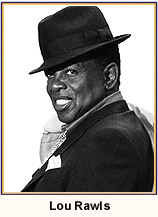
Louis Allen Rawls was born in Chicago on December 1, 1935, and was raised on the city’s south side by his grandmother. He sang in the choir at his Baptist church starting at age seven, and became interested in popular music as a teenager by attending shows at the Regal Theatre, with genre-crossing singers like Joe Williams, Arthur Prysock, and Billy Eckstine ranking as his particular favorites. Rawls also tried his hand at harmony-group singing with schoolmate Sam Cooke, together in a gospel outfit called the Teenage Kings of Harmony.
From gospel and early R&B to soul and jazz to blues and straight-up pop, Lou Rawls was a consummate master of African-American vocal music whose versatility helped him adapt to the changing musical times over and over again, while always remaining unmistakably himself. Blessed with a four-octave vocal range, Rawls’ smooth, classy elegance — sort of a cross between Sam Cooke and Nat King Cole — permeated nearly everything he sang, yet the fire of his early gospel days was never too far from the surface. He made his name as a crooner, first by singing jazz standards, then moving on to soul in the mid-’60s, and capped the most commercial phase of his career with a productive stint at Philadelphia International during the latter half of the ’70s. Even after his days as a chart presence were over, Rawls remained a highly visible figure on the American cultural landscape, pursuing an acting and voice-over career in addition to his continued concert appearances, and doing extensive charity work on behalf of the United Negro College Fund.
Lou Rawls Passed on January 6th of 2006. May he rest in Peace..
Biography by Steve Huey
SOULIN’ 1972
From the opening number “Whole Lotta Woman” you know that you are in for a swingin’ time. The ballad “Love Is a Hurtin’ Thing” and “Breakin’ My Back” were played on top 40 radio. (And with good reason.) “You’re The One” is a wild, soulful number. Lou’s “Don’t Explain” is one of the sassiest versions ever done! There is a little story as Lou sings “Memory Lane” and continues with a monologue followed by “It Was A Very Good Year”. Lou is very loose as he gives this song new definition and life. No one has ever sung “On A Clear Day” like this before or since. Instead of a ballad, Lou sings this song uptempo, but with conviction.
Recommended for those who like a soulfully upbeat male jazz singer.